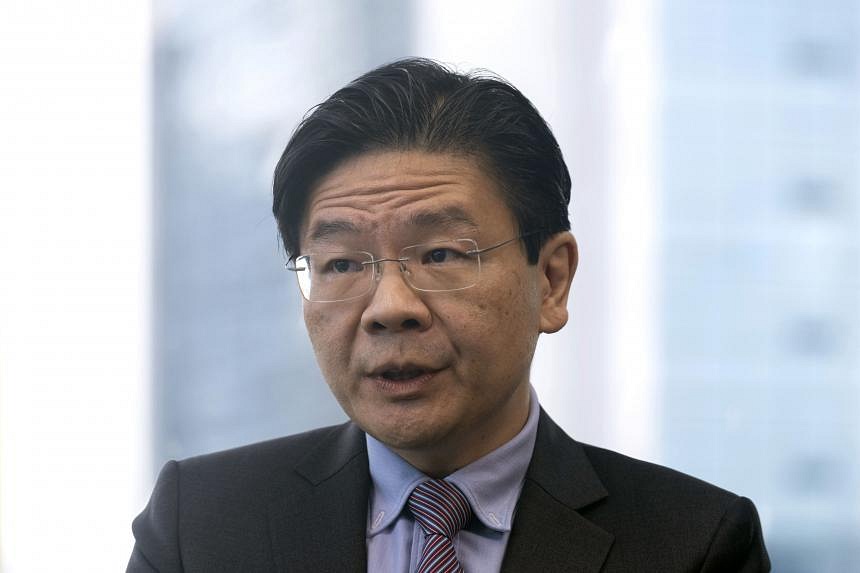from straitstimes.com:
China and US don't want conflict but could 'sleepwalk' into it amid rising tensions: DPM Wong
DPM Lawrence Wong warned that rising tensions between the two countries could easily result in accidents happening around the Taiwan Strait. PHOTO: BLOOMBERG
Hariz Baharudin
Assistant News Editor
PUBLISHED
AUG 16, 2022, 2:22 PM SGT
FacebookTwitter
SINGAPORE - Both China and the United States do not want conflict, but strained relations and recent decisions by both superpowers could lead the world into more dangerous territory, Deputy Prime Minister Lawrence Wong said.
In an interview with news agency Bloomberg on Monday (Aug 15), he warned that
rising tensions between the two countries, including over Taiwan, could easily result in near misses or accidents happening around the Taiwan Strait or in the South China Sea.
This has happened before, said Mr Wong, who was asked by Bloomberg editor-in-chief John Micklethwait about US-China tensions and the risk of miscalculation, including over
US House Speaker Nancy Pelosi's visit to Taiwan earlier this month.
On Monday, China's military
carried out more exercises near Taiwan, following a separate visit by a group of US lawmakers.
"We are starting to see a series of decisions being taken by both countries that will lead us into more and more dangerous territory. You could easily have near misses or accidents happening around Taiwan Strait or on the South China Sea," said Mr Wong, who is also Finance Minister.
He cited a 2001 incident - when US-China relations were much better - in which a US spy plane made an emergency landing on China's Hainan Island after colliding with a Chinese jet. Beijing eventually released the 24 crew members after the US expressed regret.
"If an accident were to happen today, the consequences may be more difficult to manage," said Mr Wong, adding that Singapore hopes the leadership on both sides can continue to engage each other, especially at the highest level.
The US-China relationship is moving in a direction that Singapore worries about, he said. Describing it as a "very consequential bilateral relationship", the minister said that while both sides have said they do not want to go to war, their adversarial relationship is likely to stay for quite some time.
This dynamic is not helped by their domestic politics, making it difficult for either side to concede any ground, he added. The US has its midterm elections in November and China its party congress later this year.
"With how things are unfolding now, we worry that there may be near misses, accidents, miscalculations, and things can get worse," he said.
Mr Micklethwait also asked Mr Wong how likely he thought a Chinese invasion of Taiwan would be, noting that the former head of the US Indo-Pacific Command had told Congress it could happen before 2027.
Mr Wong replied: "It is hard to say, especially now, where things are getting more and more uncertain. Taiwan is certainly one flashpoint.
"It can easily become very dangerous, as we have seen in recent events, and can even escalate quite quickly, not because either party deliberately wants this to happen."
He added: "Both sides understand the consequences and really do not want to go into conflict. The leadership on both sides understand this. But as they say, no one deliberately wants to go into battle, but we sleepwalk into conflict, and that is the biggest problem and danger."
He noted that both America and China
have an understanding on the one-China policy, and that has enabled both sides to maintain peace in the Taiwan Strait for many decades. But this is starting to change amid broader dynamics - the US is concerned that China is rising and going to take its place, while China is concerned that the US is trying to contain its rise.
Mr Wong also notes that the US administration understands the strategic importance of engaging this part of the world, and is sure that it will do everything it can to strengthen and enhance that engagement.
"From Singapore's point of view, we look at it this way - we want to create a framework in the Asia-Pacific, particularly in South-east Asia, where all the major powers have stakes in the region, both the US and China," he added.
"We think that will contribute to a more stable configuration, an overlapping circle of friendships, where everyone has stakes here and hopefully, that will increase interdependencies and help make this a more stable configuration."
Asked whether Singapore has gained from US-China tensions as
businesses look at the Republic as a hub compared with somewhere like Hong Kong, Mr Wong stressed that it takes no joy from conflict.
"We will always want Singapore to be the bastion of stability and opportunity even in an uncertain and dangerous world. We take no joy when places around us suffer negative consequences," he said.
"We want to see the world prosper and we want to see stability around the world. We want to see the economy functioning in a rules-based multilateral system."
















